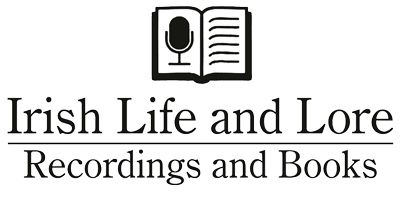Éamonn Boyce recalls his visit to Kilmainham Gaol in the 1940s, and the restoration work undertaken by volunteers. He explains that two of his maternal uncles were involved in the 1916 Rising. Thomas Dunne was in the King Street area. Later, his younger brother John was captured by the Black and Tans. After the signing of the Treaty, Thomas was in the Four Courts where he was wounded by a bullet which lodged near his spine and remained there until his death. In 1927 he emigrated to the USA. He died in 1967. Their sister, Éamonn’s mother Mary Josephine Dunne, was a member of the Drumcondra branch of Cumann na mBan and Éamonn remembers the regular meetings of the women during his childhood. Dympna, Éamonn’s wife, mentions the work of their own two sons, Brendan and Ruairi, who are currently conducting family research. Éamonn recalls his childhood in Dublin. His father came from Emerald Square in Dolphin’s Barn and worked as a labourer in Gilbey’s Wine Merchants, where he met his wife. In as much as Éamonn knows, his father joined the Volunteers on their formation. He was loyal to John Redmond and fought in France. His wife’ brothers never forgave her for marrying a British soldier. Éamonn discusses his membership of the IRA from 1952 and emphasises the fact that the movement at the time was quite different to that of more recent years. He also considers the reasons why he joined up. Through a work colleague he met Éamonn MacThomáis, who brought him to a meeting in Dublin. The Armagh Raid is remembered, as is its public reception. He has no regrets about his membership and he served eight years in jail from 1954 until his release in 1962. Chief of staff Tony McGann’s instructions about the Armagh Raid are recalled and the later unsuccessful Omagh Raid is also discussed. Éamonn does not support later IRA actions and bomb-making activities from 1956 onwards, and he explains that he became disillusioned because of these activities. After 1962, he was no longer a member of the IRA although he became involved with the Bodenstown Commemoration and other peaceful activities. He talks about the historical background, the Ulster Plantation and Scottish Presbyterian immigrants. Modern political attitudes to Irish unity and the IRA campaign from 1956 onwards are discussed, and an anecdote is told relating to a visit to Belfast and Milltown cemetery. He recalls some of the old members of Cumann na mBan, people such as Rose Mulligan (later Fitzpatrick) and Agnes Burke, who would visit his mother’s house. An anecdote is told about the welcome given to these women at the Gresham Hotel for their social meetings. Éamonn’s father had died in 1945 but his time in the British Army was never mentioned. Dympna Boyce is the grand-niece of Michael Mallin who was executed on May 8th 1916. Her father was jailed in 1927-28 in Mountjoy Prison for his membership of the IRA. Her great-grandfather, Joseph Hickey from the Strawberry Beds in Dublin, was a Fenian who had to emigrate to Liverpool. His youngest daughter Josephine, Dympna’s grandmother, was a sister of Agnes Hickey who married Michael Mallin. The Thewlis sisters, Lily and Cissy, were first cousins to her mother, and these women were all members of Cumann na mBan. Lily and Cissy Thewlis died in the late 1990s. Dympna recalls the old republican songs her mother played and sang at their home on Swilly Road in Cabra. Dympna’s brother Kevin, who was born in 1933, was incarcerated in Crumlin Road Prison for three months in 1954. Their brother, Brendan, born in 1935, was in Fianna Éireann and took part in the Omagh Raid with Éamonn Boyce. She remembers that her mother often spoke about their Uncle Mike, their grandfather and the Thewlis sisters. Their mother was a Clann na Phoblachta supporter, while their father was more supportive of Fianna Fáil, she believes. Éamonn recalls Éamon de Valera and the split with Cathal Brugha, and he remarks that his mother had told him that she cried when the Treaty was accepted. He further recalls the transistor radio and camera that his friend, Capuchin priest Fr Lavinus, smuggled into him in prison. The men had never met before but for years they corresponded. It was only after his release that they met and Éamonn remembers the priest’s funeral. He considers the revolutionary history of Ireland from 1798 onwards. It is his opinion that gangsterism now prevails in the North, and he discusses the discrimination against Roman Catholics in the six counties and the effect of the property vote. Although Dympna never met her granduncle, Michael Mallin, all through her life she has heard about him, and she says that she feels him near when she visits his cell in Kilmainham Gaol and the prison yard.

Éamonn Boyce (b. 1925) and Dympna Boyce (b. 1938) (grand-niece of Michael Mallin)
Éamonn Boyce (b. 1925) and Dympna Boyce (b. 1938) (grand-niece of Michael Mallin)
€10.00 – €20.00
Additional information
| Type: | MP3 |
|---|---|
| Audio series: | The 1916 Rising Oral History Collections |
| Bitrate: | 128 kbps |
| Download time limit: | 48 hours |
| File size(s): | 50.78 MB |
| Number of files: | |
| Product ID: | CD191602-098 |
| Subject: | Michael Mallin, The IRA before 1956 and the women of Cumann na mBan |
| Recorded by: | Maurice O’Keeffe – Irish Life and Lore |








